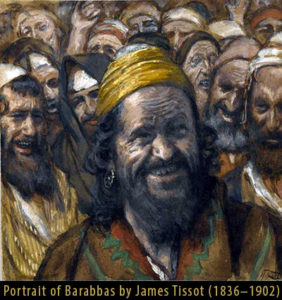And as soon as it was morning, the chief priests held a consultation with the elders and scribes and the whole Council. And they bound Jesus and led him away and delivered him over to Pilate. And Pilate asked him, “Are you the King of the Jews?” And he answered him, “You have said so.” And the chief priests accused him of many things. And Pilate again asked him, “Have you no answer to make? See how many charges they bring against you.” But Jesus made no further answer, so that Pilate was amazed.
Now at the feast he used to release for them one prisoner for whom they asked. And among the rebels in prison, who had committed murder in the insurrection, there was a man called Barabbas. And the crowd came up and began to ask Pilate to do as he usually did for them. And he answered them, saying, “Do you want me to release for you the King of the Jews?” For he perceived that it was out of envy that the chief priests had delivered him up. But the chief priests stirred up the crowd to have him release for them Barabbas instead. And Pilate again said to them, “Then what shall I do with the man you call the King of the Jews?” And they cried out again, “Crucify him.” And Pilate said to them, “Why, what evil has he done?” But they shouted all the more, “Crucify him.” So Pilate, wishing to satisfy the crowd, released for them Barabbas, and having scourged Jesus, he delivered him to be crucified. –Mark 15:1-15
I think it’s interesting to notice whose names get recorded in history. The Nicene and Apostles’ Creeds record Mary’s name, but, interestingly, also Pilate’s. Jesus interacts with some people directly and intensely, and yet they have no name recorded, but others do without much of a pattern as to why or why not. The repentant thief on his own cross is a major part of the story, as is the Gentile centurion confessor at the foot of Jesus’ cross. Neither of their names was recorded, however.
The passage above has one of these recorded names: Barabbas. He’s certainly not commendable, yet most of us have heard his name at least around Holy Week. There was a time when I thought of Barabbas (Bar-Abbas: “son of the father”) as an incidental character in the story. The story goes like this: there was a true criminal and a true righteous man, and the crowd chose the criminal. That is true and important, but I’ve found that there is much more.
Recall how all along Jesus has been against Israel’s rebellious, nationalist zealots. These are the Pharisees, many who were ruling the Temple, scribes, elders, and plenty of “lay-people.” When Jesus condemns the Temple, He says that what should have been a blessing for the nations (Gentiles) had been turned into a den of robbers. But the word for “robbers” is rebels or insurrectionists or revolutionaries. They are seeking to destroy all other nations through violence and war rather than blessing the nations. As in the parable of the wicked tenants, they refuse to give away God’s blessings of His vineyard, Israel, and hoard these blessings instead for the nation of Israel only.
When Jesus was arrested in the Garden of Gethsemane, He used the same term: “Have you come out with your swords and clubs as though I were a revolutionary, nationalist insurrectionist?” When John the Baptizer asked, “Who warned you to flee from the wrath to come?” he meant the wrath of God against Judaizers, these revolutionary, nationalist insurrectionists. Jesus preached that the coming of God’s Kingdom for Israel, and then for the world, would not come through war and violence, but through the gospel. You were definitely in the cross hairs of Jesus’ opposition if you were all about the nation of Israel and trying to establish dominance through violence.
Now we return to Barabbas. This guy is in no way incidental, since Mark makes it clear that he was “among the rebels in prison, who had committed murder in the insurrection.” A-ha! He’s one of the revolutionary, nationalist insurrectionists. His name leaves no doubt that he is a Jew. So, what is presented by Pilate to the Jewish crowd is one man who has murdered and rebelled in the name of an Israel who would crush the nations, and another man who has healed and submitted to the Father of Israel who would bless the nations. Which one did they prefer? The answer shows us that Barabbas may not have been that important an individual, but symbolically he represented Israel’s true love, and it isn’t Jesus or Jesus’ way of bringing the Kingdom.
Would we have chosen better in our own strength and understanding? Not likely. As we read on in this story, now with greater depth, of Jesus’ scourging and path to crucifixion, we are witnessing God’s grace, God’s sovereign and saving presence. This is the love of God doing for us what we could not do for ourselves. That’s the gospel! Come hear it preached and enacted in the supper with Jesus this Sunday.
